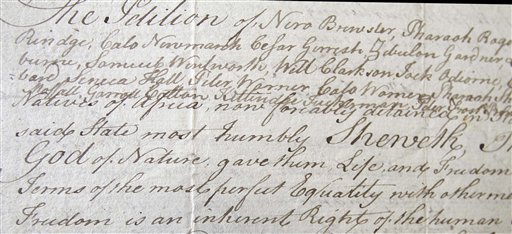By MORGAN TRUE
Associated Press
CONCORD, N.H.
When 20 slaves petitioned New Hampshire two centuries ago seeking their freedom, lawmakers decided the time wasn’t right and delayed action.
Now, 233 years later, legislators in one of the nation’s whitest states have decided the time is right to consider the request. A Senate committee on Wednesday unanimously recommended the full body posthumously emancipate the 14 petitioners who never were granted freedom.
Woullard Lett, a member of the Manchester NAACP, said it’s never too late to right a wrong.
Valerie Cunningham, a historian and preservationist from Portsmouth, said she came across the slaves’ petition in state archives nearly 30 years ago. It was originally submitted to the New Hampshire General Assembly on Nov. 12, 1779, while the Revolutionary War was still being fought.
The slaves all served in the war effort and believed the freedom being sought by colonists should be extended to them as well. They wrote, “Freedom is an inherent right of the human species” and that “public tyranny and slavery are alike detestable to minds conscious of the equal dignity of human nature.”
Cunningham said in a history she wrote of the black community in the state’s Seacoast region that of the original petitioners, six of the slaves were later freed and 14 died in bondage with legislators never acting on their request.
Black people accounted for 1.1 percent of New Hampshire’s 1.3 million people in the 2010 U.S. Census.
The state was the last to honor Martin Luther King Jr. with a state holiday, but the slain civil rights leader’s widow and children found New Hampshire residents welcoming when they visited following his funeral in 1968.
Cunningham said the state is no less welcoming to blacks than the rest of New England, but the tiny population in New Hampshire makes it more difficult for their voices to be heard.
State Sen. Martha Fuller Clarke, D-Portsmouth, is sponsoring the Senate bill. She told colleagues Wednesday that she hopes the Legislature will act quickly to emancipate the former slaves. The approval by the Public and Municipal Affairs Committee means the bill can now go before the full Senate.
Gov. Maggie Hassan has said she would sign the bill if approved by the full Legislature.
Cunningham said acting now would help bring attention to an African-American burial ground in downtown Portsmouth, where a mayoral committee is hoping to build a memorial park. The African Burying Ground Committee has worked for almost a decade to get the memorial built, and though they need additional money, a spokesman said they may break ground on the project this summer. The design would include granite engravings with passages from the petition.
The goal of the bill and the memorial park is to celebrate the culture and contribution of blacks to New Hampshire and bring that history to the fore, Cunningham said.
Lett said he sees the bill as largely symbolic but hopes its passage will mean the Legislature doesn’t plan to wait another 200 years to address the concerns of the black community today. He said those concerns include persistent wage and health inequalities and a disproportionate number of blacks in the state prison system.

COMMENTS
Please let us know if you're having issues with commenting.